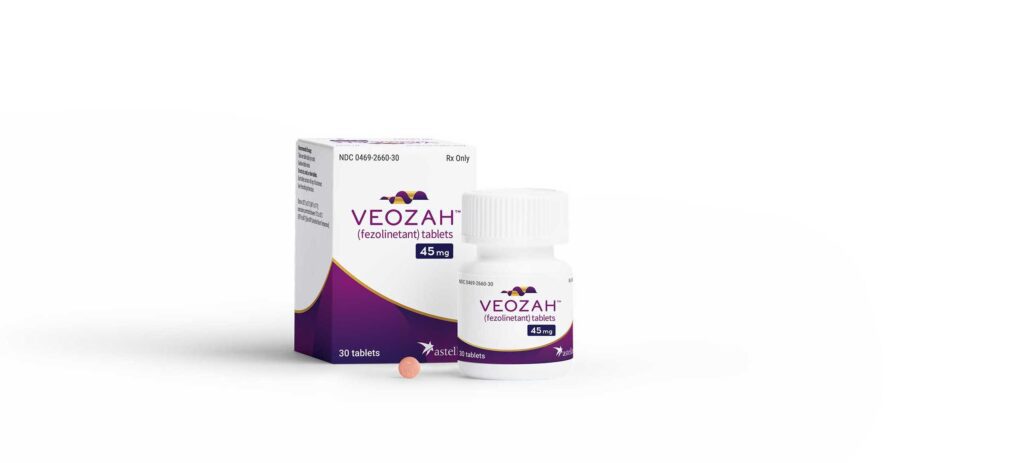National Women’s Health Week brought a groundbreaking development: the approval of a new treatment option for hot flashes caused by menopause.
On May 12, the U.S. Food and Drug Administration (FDA) approved Veozah (fezolinetant), developed by Astellas Pharma US. It’s the first approved neurokinin 3 (NK3) receptor antagonist to treat moderate to severe hot flashes. “It works by binding to and blocking the activities of the NK3 receptor, which plays a role in the brain’s regulation of body temperature,” explains the FDA.
The approval is a welcome development in an area of much-needed research and development.
Why do menopausal women have these symptoms?
There is a delicate balance between estrogens, which are hormones produced by a woman’s ovaries, and neurokinin B (NKB), a brain chemical that regulates the body’s temperature control center located in a specific area of the brain prior to menopause.
However, during menopause, as estrogen levels drop, this balance is disrupted. This can cause uncomfortable symptoms such as severe vasomotor symptoms (VMS).
VMS are the most commonly reported symptoms for which women seek treatment and can include hot flashes, night sweats, and sleep disturbances.
The history of menopause treatment research
For too long, menopause research has been lacking – and treatment options have been slim to none.
According to the Mayo Clinic, typical options for treating menopause have included hormone treatment, vaginal estrogen, low-dose antidepressants, Gabapentin (a medication used to treat seizures), Clonidine (a high blood pressure medication), and medications that prevent osteoporosis. However, a majority of available treatments were not developed specifically for menopause.
In addition, hormone replacement therapy (HRT) faces reputational challenges. HRT can ease many menopausal symptoms, reported The New York Times in February. But HRT has long been viewed negatively due to a flawed trial conducted in the early 2000s, which said the treatment caused more risks than benefits. A reanalysis of the data in 2019 found the use of HRT in younger or early postmenopausal women, in fact, “had a beneficial effect on the cardiovascular system, reducing coronary disease and all-cause mortality. Notwithstanding this, the public opinion on HRT has not changed yet, leading to important negative consequences for women’s health and quality of life.”
“The treatment’s reputation, however, has never fully recovered, and the consequences have been wide-reaching,” said The New York Times.
The impact of the new treatment for hot flashes
VMS is the most frequently reported menopausal symptom that prompts women to seek medical attention. According to Astellas Pharma, about 60-80% of women in the United States are affected by VMS. Some women experience significant symptoms for over a decade after their last menstrual cycle.
VEOZAH employs a novel mechanism of action that targets the temperature regulation center in the brain, leading to a reduction in both the frequency and severity of VMS.
The approval is based on results from the BRIGHT SKY™ program, including three Phase 3 clinical trials with over 3,000 participants in the U.S., Canada, and Europe. The SKYLIGHT 1™ and SKYLIGHT 2™ trials show the drug is both safe and effective in treating moderate to severe VMS due to menopause. The SKYLIGHT 4™ study provides additional data on the drug’s long-term safety.
“Today’s approval of fezolinetant is a significant and, I believe, long-awaited milestone for individuals in the U.S. who experience moderate to severe vasomotor symptoms during the menopausal transition,” said Genevieve Neal-Perry, M.D., Ph.D., Chair, UNC School of Medicine Department of Obstetrics and Gynecology. “This therapy is based on our understanding of the biology behind hot flashes. I’m excited to know that patients will have the option to choose this nonhormonal treatment.”
Marci English, Vice President and Head of BioPharma Development at Astellas, stated: “FDA approval of this new treatment for moderate to severe VMS due to menopause is a testament to Astellas’ commitment to delivering innovative therapies in areas of unmet need that have been underserved, including women’s health.”
To learn more about why we need to invest in women’s health, listen to the I am BIO Podcast, Let’s Get Uncomfortable: Talking about Women’s Health.




